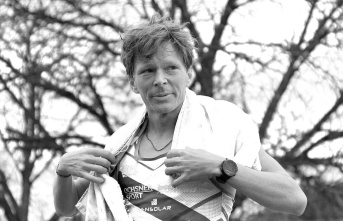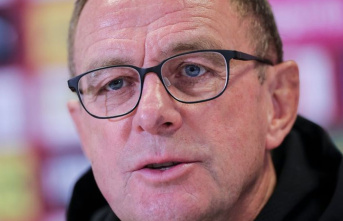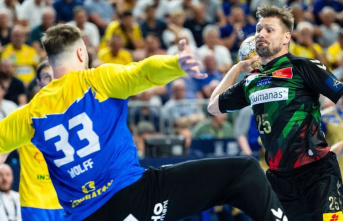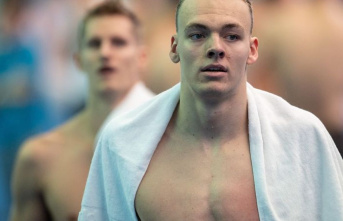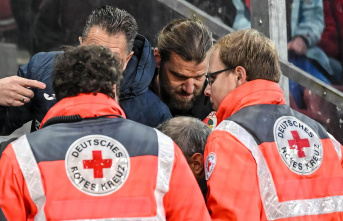With the re-admission of Russian and Belarusian athletes, the International Olympic Committee has exacerbated the controversy in world sport and raised many questions. Now the world federations have to decide whether and how to implement the IOC guidelines and monitor the neutrality of the athletes from these two countries at starts. The fact that Russian and Ukrainian athletes are supposed to meet again on international sports stages in the middle of the war is likely to get tricky.
These athletes should be listed as neutral individual starters under the French abbreviation AIN. Your competition attire should be either all white or another single color. Team logos are forbidden to Russians and Belarusians, as are national symbols, flags and playing their anthems. Athletes from both countries with connections to the military and security bodies and teams remain locked out.
The approved Russian and Belarusian athletes should also be forbidden to show their support for their countries and the war in Ukraine at official competitions, in interviews and on social networks. In the event of a violation, the world associations should impose immediate penalties.
For the German handball president Andreas Michelmann, this ban has an "understandable clarity" for team sports. A neutral team from Russia or Belarus would always be recognizable as Russia or Belarus - "and that goes against the spirit of the sanctions that are still in place". According to the IOC proposal, the definition of team sports and competitions should be based on the rules of the world association. At the Tokyo 2021 Olympics, Russia has won 21 medals in team sports, including seven in gold.
The Olympic umbrella organization has advised the world federations to set up an independent body. This is intended to ensure a uniform interpretation of the guidelines adopted for the return of athletes from both countries to world sport. According to the IOC proposal, the body could be established under the umbrella of the associations of summer and winter sports federations and non-Olympic world federations.
Russia's Defense Ministry has said more than 20 of the country's Tokyo Games medalists have military ranks. Of the 71 medals won in Japan, 45 were won by athletes affiliated with the Army Central Sports Association. Traditionally, clubs like CSKA or Dynamo, which have ties to the military or the secret service, have been fixtures in almost all Russian sports.
The German top sports associations reacted cautiously. You now have to wait for the implementation proposals from the world associations. They can be sure of the support of the Federal Ministry of the Interior. The BMI wants to ensure "avoid disadvantages for German athletes with regard to qualification for the Olympic Games," said a spokesman for the ministry. German athletes "should not be the victims of decisions by international sports associations".
The Athletes Germany Association considers the IOC decision to be wrong. "A collective exclusion would have been a suitable and legitimate means - after multiple breaches of the values and rules of the Olympic movement - even without violating bans on discrimination," it said in a statement.
Russia's Sports Minister Oleg Matyzin criticized the IOC decision as "inhuman". "The IOC's recommendations to classify Russian athletes are unlawful and the individual decision on team sports is openly discriminatory," Matyzin wrote on his ministry's Telegram channel. The Russian National Olympic Committee also spoke of discrimination and exclusion. The NOC denounced the IOC ban on athletes from making positive statements in the media about Russia's war of aggression against Ukraine as political paternalism.
Ukraine wants to continue preventing Russian and Belarusian athletes from participating in international competitions. "We will make joint efforts to ensure that no z-patriot enters the international sports arena," wrote the Minister of Sport and head of the National Olympic Committee, Wadym Hutzajt, on Facebook. The letter Z is the official Russian symbol of Moscow's war against Ukraine. According to former world boxing champion Wladimir Klitschko, the IOC "contaminated the Olympic spirit" with the decision. He accused IOC President Thomas Bach of serving the "colors and interests of Russia". How does Berlin politics rate the IOC course?
Federal Interior Minister Nancy Faeser sees the IOC decision as a "slap in the face" to Ukrainian athletes. Anyone who lets the warmonger Russia use international competitions for its propaganda "damages the Olympic ideal of peace and international understanding," said the SPD politician. The sports policy spokesman for the CDU/CSU, Stephan Mayer, said that the roles of perpetrators and victims had finally been grotesquely reversed. The federal government's human rights commissioner, Renata Alt (FDP), also considers the recommended return of Russians to be fundamentally wrong: "The IOC is once again demonstrating a lack of understanding of human rights."
Even before the IOC decision, Ukraine threatened to boycott the Paris Games if athletes from Russia and Belarus were admitted. Similar threats also came from the Baltic states and Poland. This is not an issue for the DOSB, the central associations and German politics. "A boycott of the Olympic Games must not be an option for German sport," affirmed Andreas Michelmann, who is also the spokesman for the leading associations. "We should have learned that from German-German sports history." And DOSB President Thomas Weikert also assured: "We start in Paris."
Rule 44.1 of the Olympic Charter stipulates that the IOC must send out invitations to the NOCs one year before the opening of the Olympic Games. That would be July 26, 2023. IOC President Bach spoke only of making that decision "at a convenient time." In some sports, Russians and Belarusians could not be there anyway: For example, the World Athletics Federation demonstratively extended the exclusion of athletes from both countries a few days before the IOC decision and also blocked access to Olympic qualifying competitions until further notice.


